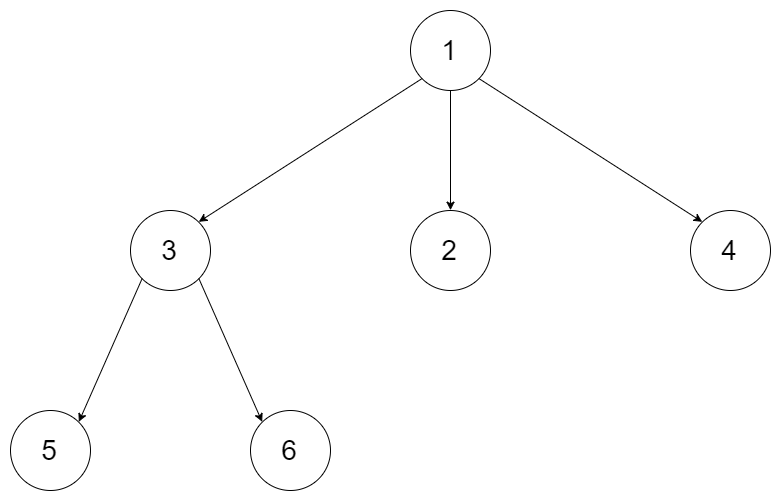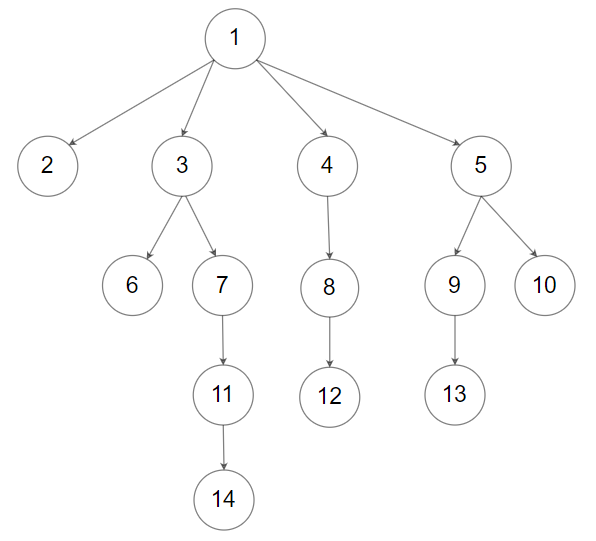Given the root of an n-ary tree, return the postorder traversal of its nodes' values.
Nary-Tree input serialization is represented in their level order traversal. Each group of children is separated by the null value (See examples)
Example 1:
Input: root = [1,null,3,2,4,null,5,6] Output: [5,6,3,2,4,1]
Example 2:
Input: root = [1,null,2,3,4,5,null,null,6,7,null,8,null,9,10,null,null,11,null,12,null,13,null,null,14] Output: [2,6,14,11,7,3,12,8,4,13,9,10,5,1]
Constraints:
- The number of nodes in the tree is in the range
[0, 104]. 0 <= Node.val <= 104- The height of the n-ary tree is less than or equal to
1000.
Follow up: Recursive solution is trivial, could you do it iteratively?
"""
# Definition for a Node.
class Node:
def __init__(self, val=None, children=None):
self.val = val
self.children = children
"""
class Solution:
def postorder(self, root: 'Node') -> List[int]:
def dfs(root):
if root is None:
return
for child in root.children:
dfs(child)
ans.append(root.val)
ans = []
dfs(root)
return ans"""
# Definition for a Node.
class Node:
def __init__(self, val=None, children=None):
self.val = val
self.children = children
"""
class Solution:
def postorder(self, root: 'Node') -> List[int]:
if root is None:
return []
stk = [root]
ans = []
while stk:
node = stk.pop()
ans.append(node.val)
if node.children:
for child in node.children:
stk.append(child)
return ans[::-1]/*
// Definition for a Node.
class Node {
public int val;
public List<Node> children;
public Node() {}
public Node(int _val) {
val = _val;
}
public Node(int _val, List<Node> _children) {
val = _val;
children = _children;
}
};
*/
class Solution {
private List<Integer> ans;
public List<Integer> postorder(Node root) {
ans = new ArrayList<>();
dfs(root);
return ans;
}
private void dfs(Node root) {
if (root == null) {
return;
}
for (Node child : root.children) {
dfs(child);
}
ans.add(root.val);
}
}/*
// Definition for a Node.
class Node {
public int val;
public List<Node> children;
public Node() {}
public Node(int _val) {
val = _val;
}
public Node(int _val, List<Node> _children) {
val = _val;
children = _children;
}
};
*/
class Solution {
public List<Integer> postorder(Node root) {
if (root == null) {
return Collections.emptyList();
}
Deque<Node> stk = new ArrayDeque<>();
stk.offerLast(root);
LinkedList<Integer> ans = new LinkedList<>();
while (!stk.isEmpty()) {
Node node = stk.pollLast();
ans.addFirst(node.val);
if (node.children != null) {
for (Node child : node.children) {
stk.offerLast(child);
}
}
}
return ans;
}
}/*
// Definition for a Node.
class Node {
public int val;
public List<Node> children;
public Node() {}
public Node(int _val) {
val = _val;
}
public Node(int _val, List<Node> _children) {
val = _val;
children = _children;
}
};
*/
class Solution {
public List<Integer> postorder(Node root) {
if (root == null) {
return Collections.emptyList();
}
Deque<Node> stk = new ArrayDeque<>();
stk.offerLast(root);
LinkedList<Integer> ans = new LinkedList<>();
while (!stk.isEmpty()) {
Node node = stk.pollLast();
ans.addFirst(node.val);
if (node.children != null) {
for (Node child : node.children) {
stk.offerLast(child);
}
}
}
return ans;
}
}/*
// Definition for a Node.
class Node {
public:
int val;
vector<Node*> children;
Node() {}
Node(int _val) {
val = _val;
}
Node(int _val, vector<Node*> _children) {
val = _val;
children = _children;
}
};
*/
class Solution {
public:
vector<int> postorder(Node* root) {
vector<int> ans;
dfs(root, ans);
return ans;
}
void dfs(Node* root, vector<int>& ans) {
if (!root) return;
for (auto& child : root->children) dfs(child, ans);
ans.push_back(root->val);
}
};/*
// Definition for a Node.
class Node {
public:
int val;
vector<Node*> children;
Node() {}
Node(int _val) {
val = _val;
}
Node(int _val, vector<Node*> _children) {
val = _val;
children = _children;
}
};
*/
class Solution {
public:
vector<int> postorder(Node* root) {
if (!root) return {};
stack<Node*> stk;
stk.push(root);
vector<int> ans;
while (!stk.empty())
{
auto& node = stk.top();
stk.pop();
ans.push_back(node->val);
for (auto& child : node->children)
stk.push(child);
}
reverse(ans.begin(), ans.end());
return ans;
}
};/**
* Definition for a Node.
* type Node struct {
* Val int
* Children []*Node
* }
*/
func postorder(root *Node) []int {
var ans []int
var dfs func(root *Node)
dfs = func(root *Node) {
if root == nil {
return
}
for _, child := range root.Children {
dfs(child)
}
ans = append(ans, root.Val)
}
dfs(root)
return ans
}/**
* Definition for a Node.
* type Node struct {
* Val int
* Children []*Node
* }
*/
func postorder(root *Node) []int {
if root == nil {
return []int{}
}
var stk []*Node
var ans []int
stk = append(stk, root)
for len(stk) > 0 {
node := stk[len(stk)-1]
stk = stk[:len(stk)-1]
ans = append([]int{node.Val}, ans...)
for _, child := range node.Children {
stk = append(stk, child)
}
}
return ans
}

